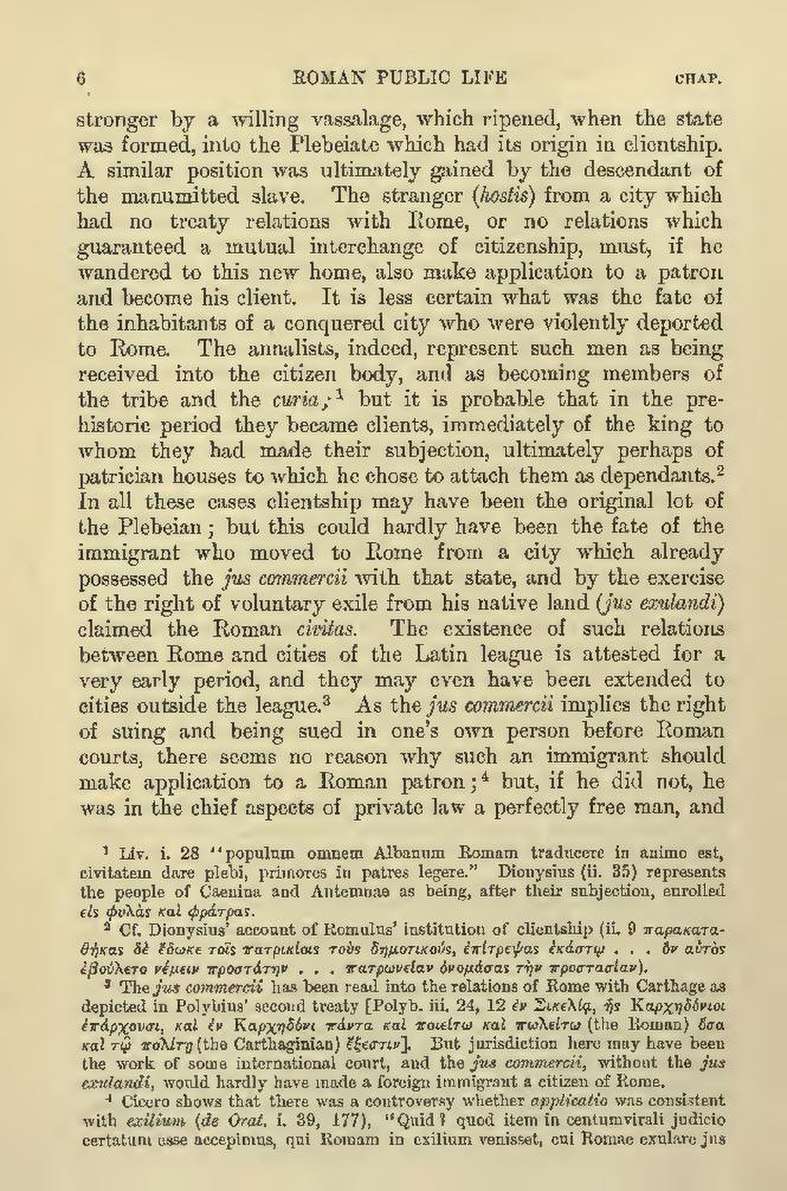stronger by a willing vassalage, which ripened, when the state was formed, into the Plebeiate which had its origin in clientship. A similar position was ultimately gained by the descendant of the manumitted slave. The stranger (hostis) from a city which had no treaty relations with Rome, or no relations which guaranteed a mutual interchange of citizenship, must, if he wandered to this new home, also make application to a patron and become his client. It is less certain what was the fate of the inhabitants of a conquered city who were violently deported to Rome. The annalists, indeed, represent such men as being received into the citizen body, and as becoming members of the tribe and the curia;[1] but it is probable that in the pre-*historic period they became clients, immediately of the king to whom they had made their subjection, ultimately perhaps of patrician houses to which he chose to attach them as dependants.[2] In all these cases clientship may have been the original lot of the Plebeian; but this could hardly have been the fate of the immigrant who moved to Rome from a city which already possessed the jus commercii with that state, and by the exercise of the right of voluntary exile from his native land (jus exulandi) claimed the Roman civitas. The existence of such relations between Rome and cities of the Latin league is attested for a very early period, and they may even have been extended to cities outside the league.[3] As the jus commercii implies the right of suing and being sued in one's own person before Roman courts, there seems no reason why such an immigrant should make application to a Roman patron;[4] but, if he did not, he was in the chief aspects of private law a perfectly free man, and.]).](the Roman) [Greek: hosa kai tô politê] (the Carthaginian)[Greek: exestin]]. But jurisdiction here may have been the work of some international court, and the jus commercii, without the jus exulandi, would hardly have made a foreign immigrant a citizen of Rome.]*
- ↑ Liv. i. 28 "populum omnem Albanum Romam traducere in animo est, civitatem dare plebi, primores in patres legere." Dionysius (ii. 35) represents the people of Caenina and Antemnae as being, after their subjection, enrolled [Greek: eis phylas kai phratras
- ↑ Cf. Dionysius' account of Romulus' institution of clientship (ii. 9 [Greek: parakatathêkas de edôke tois patrikiois tous dêmotikous, epitrepsas hekastô . . . on autos ebouleto nemein prostatên . . . patrôneian onomasas tên prostasian
- ↑ The jus commercii has been read into the relations of Rome with Carthage as depicted in Polybius' second treaty [Polyb. iii. 24, 12 [Greek: en Sikelia, hês Karchêdonioi eparchousi, kai en Karchêdoni panta kai poieitô
- ↑ Cicero shows that there was a controversy whether applicatio was consistent with exilium (de Orat. i. 39, 177), "Quid? quod item in centumvirali judicio certatum esse accepimus, qui Romam in exilium venisset, cui Romae exulare jus
